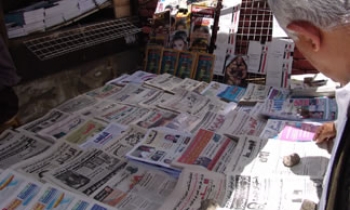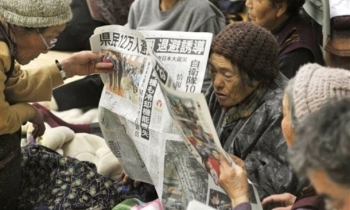LAN Chengzhang sat in a car outside the office of a mining company while a colleague ventured inside to make inquiries.
It was his first month of work with his newspaper and Lan had decided to take on what anyone in the area knew could be a most dangerous subject: The illegal coal mines that proliferate in the sooty hill country of Shanxi province.
Within minutes, a band of men armed with lengths of pipe and other crude weapons set upon him, beating him so badly that within a few hours he succumbed to the injuries and died. Though severely beaten, his colleague from The China Trade News survived to tell the tale.
Attacks against journalists are not uncommon in China, even if deaths are rare. But in ways that few could have expected, the murder on Jan 11 of this untested reporter for an obscure publication has become a watershed event, with reporters and editors around the country seeing in the murky contours of the case a cautionary tale for their booming but troubled profession.
That Lan’s death has become a national event was helped in no small measure by China’s leader, Hu Jintao, who in an unusual statement a few days afterwards demanded that justice be done.
But it also highlighted the culture of corruption that many journalists acknowledge pervades the industry, particularly the practice among some reporters of demanding money from subjects to avoid damaging articles.
Hu, who has spoken often of the need for the government to strengthen its control over the news media, has been seen as anything but a friend of journalists.
Given that, many here said, and after several days of intense commentary about the killing in the international news media and on Chinese blogs and websites, Hu may have been moved to protect his country’s image.
"Hu Jintao is very much concerned about China’s international image," said Zhan Jiang, dean of journalism at the China Youth University for Political Science in Beijing. "Since this incident has been widely reported both at home and overseas, he had to do something."
Inside the Chinese news media, introspection over the killing of Lan has been unusually forthright, mixing criticism of the government with harsh self-examination.
Beijing is condemned for limiting the scope of honest, aggressive journalism, and the journalists themselves are condemned, indeed by themselves, for giving in to corruption as a professional way of life.
"This kind of control and degeneration are inseparable," said Zhang Ping, a veteran editor at Southern Metropolis magazine.
"The control dims the hopes one has for a career in journalism and many reporters, such as people at Xinhua, don’t have any honourable feelings from being a journalist. They get no rewards the normal way and discover that in China only lie- telling can bring you income."
Xinhua is the main government-run Press agency.
Huang Liangtian, who was recently dismissed as editor of Bai Xing magazine because of the publication’s probing investigative style, was even more caustic in his assessment.
"China basically doesn’t have any journalists in the real sense," he said, dismissing the hair-splitting that many have engaged in over whether Lan had proper credentials or not. "Everybody is part of the machine, a propagandist for the party’s policy."
In fact, the scope for reporting has expanded significantly in the last decade, worrying the government. But along with the explosion in the number of titles have come strong commercial pressures, bringing about what many describe as a compulsion to mix news-gathering and advertising.
Many reporters say they are given revenue quotas that they must meet by selling news coverage to the subjects they write about.
The issue of this sort of corruption has emerged as a major subtext in the discussion of Lan’s death, albeit with bitter disagreement over the facts.
In Datong, the city where he was killed, he was quickly labelled an impostor, the implication being that he had visited an illegal coal mine to shake down its owner, promising not to write about him in exchange for a payment. The city quickly threatened to start a campaign against "fake journalists".
Lan’s newspaper has added little clarity to the picture. While acknowledging that he was employed there, the paper denied that he had been assigned to write about illegal coal mines.
It even declined to describe him as a reporter, using the more ambiguous formulation of media worker.
The police report about the killing said that Chang Hanwen, a colleague of Lan’s who had teamed up with him in the coal-mine reporting, had stated that Lan had promised that the mere display of Press credentials at the mine would produce "at least 1,000 yuan (RM452)" in payoffs.
But later, Chang, who was wounded in the attack, denied this. "I don’t know where they got that from," he said. "When I saw it on a website, I was really mad."
Amid this confusion and lacking any real evidence, many journalists seem to have concluded that Lan was indeed a swindler.
This rush to judgment, in turn, appears to reflect their recognition of the dismal state of their profession. In one interview after another, veteran reporters gave detailed anecdotes of pervasive corruption in the industry.
"We have to admit that the public image of journalists is increasingly depressed, and the causes for this should give all of us reason to reflect," said Liu Wanyong, an investigative reporter with The China Youth Daily in Beijing.
"In 2005, I went to a courthouse in Liaoning Province and said, ‘I am a journalist,’ and the court official’s response was, ‘Are you here on some commercial business?’" Liu said. "I showed my papers, and they said, ‘Are you representing the plaintiff or the defendant?’ The fact is, they are used to seeing reporters who represent one side or another — usually whichever has the most money."









